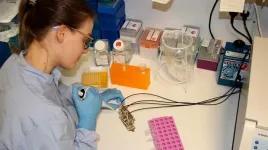INFORMATION:
Other collaborators on this study included Anastasia Matchanova; Luis D. Medina; Rheeda Walker, all of the UH Department of Psychology; and Kenneth Podell, Houston Methodist Hospital.
Have a pandemic plan? Most people did not
Survey indicates majority of people were unprepared in early stages of COVID-19 pandemic
2021-06-30
(Press-News.org) Since the onset of the COVID-19 pandemic last year, medical experts have stressed the importance of having a plan in the event of a positive test result. Where should you self-isolate? Do you have personal protective equipment for family members? Who should you notify about your diagnosis? An overwhelming 96% of healthy, educated adults surveyed by University of Houston researchers in the early stages of the pandemic did not have a comprehensive plan in mind, while 62% didn't have a plan at all.
"What that suggests is that it was difficult even for very high functioning people to digest and use all the complex information that was quickly emerging about COVID. They were largely unprepared and unsure how to proceed," said Steven Woods, UH psychology professor and corresponding author of the study published in the Journal of Clinical and Experimental Neuropsychology.
The World Health Organization declared COVID-19 a pandemic on March 11, 2020. Woods and Michelle A. Babicz, first author and UH clinical psychology doctoral student, spoke to 217 participants by phone between April 23 and May 21, 2020. Survey participants completed standard measures of neurocognition, health literacy, intelligence, personality and anxiety, while also answering questions about their COVID-19 information seeking skills, knowledge and adherence to recommendations from the Centers for Disease Control and Prevention, such as wearing masks and social distancing.
"The surprising outcome confirms the importance of building basic health literacy skills, because people's ability to understand numbers and medical terms was associated with how effectively they looked for credible COVID-19 information on the internet, how much they learned about COVID-19, and how they used that information to keep themselves and others safe," explained Woods, who runs the Cognitive Neuropsychology of Daily Life Laboratory in the UH College of Liberal Arts and Social Sciences.
Researchers point out that if these healthy individuals had a challenging time absorbing COVID-related information, then such challenges may be even greater in people with limited educational opportunities or with neurocognitive disorders, such as Alzheimer's disease or a brain injury, due to low health literacy and impaired memory.
"People with lower neurocognitive ability may be at higher risk for acquiring and using misinformation about COVID-19, which could have downstream implications for both personal and public health," said Babicz.
The researchers offer an array of effective techniques for individuals to improve their ability to learn and remember health information, including spacing, which is processing new information over time rather than cramming it in all at once. In addition, they suggest using flash cards to test knowledge recall and elaboration -- the practice of building a story around what one has learned.
"The findings may also help with the development and targeting of information campaigns as new public health crises inevitably emerge," Babicz added. "We suggest these campaigns use language and constructs that are accessible to persons with low levels of health literacy, perhaps through community-based participatory research approaches."
ELSE PRESS RELEASES FROM THIS DATE:
COVID-19 in Europe and travel: Researchers show the important role of newly introduced lineages in COVID-19 resurgence after last summer
2021-06-30
Following the first wave of SARS-CoV-2 infections in spring 2020, Europe experienced a resurgence of the virus starting late summer. Although it appears clear that travel had a significant impact on the circulation of the virus, it remains challenging to assess how it may have restructured and reignited the epidemic in the different European countries.
In a new study published in the journal Nature this June 30th, 2021, Philippe Lemey - Rega Institute, KU Leuven, Simon Dellicour - SpELL, Spatial Epidemiology Lab, Université Libre de Bruxelles, and their collaborators, built a phylogeographic model to assess how newly introduced viral lineages, as opposed to ...
Fairer finance could speed up net zero for Africa by a decade
2021-06-30
Levelling up access to finance so that poorer countries can afford the funds needed to switch to renewable energy could see regions like Africa reaching net zero emissions a decade earlier, according to a study led by UCL researchers.
Access to finance (credit) is vital for the green energy transition needed to reduce global greenhouse gas emissions, as laid out in the Paris Agreement. But access to low-cost finance is uneven, with the cost of securing capital to help reach net zero differing substantially between regions.
Modelling created for the study, Higher cost of finance exacerbates a climate investment trap in developing economies, published in Nature Communications, ...
MD Anderson research highlights for June 30, 2021
2021-06-30
HOUSTON - The University of Texas MD Anderson Cancer Center's Research Highlights provides a glimpse into recently published studies in basic, translational and clinical cancer research from MD Anderson experts. Current advances include expanded use of a targeted therapy for a new group of patients with leukemia, molecular studies yielding novel cancer therapeutic targets, insights into radiation therapy resistance and a community intervention to reduce cervical cancer rates.
Using acalabrutinib as initial treatment for chronic lymphocytic leukemia
Chronic lymphocytic leukemia (CLL) is a cancer that occurs in the blood, bone marrow, lymph nodes, liver and spleen. It is the most common leukemia in adults, and while there are treatments ...
Repairing 'broken' hearts -- new promising surgical technique for heart attacks
2021-06-30
Heart attack, medically known as myocardial infarction (MI), is a common heart condition. MI is caused by problems in blood supply to parts of the heart. In severe cases, MI could be accompanied by ruptures in the wall separating different parts of the heart, such as in the ventricular septum (a wall that separates the right ventricle that pumps deoxygenated blood to the lungs for oxygenation, from the left ventricle that pumps oxygenated blood to rest of the body). Not surprisingly, without appropriate surgical intervention, a VSR due to MI increases the chances of death.
Current surgical techniques ...
'Plugging in' to produce environmentally friendly bioplastics
2021-06-30
Bioplastics -- biodegradable plastics made from biological substances rather than petroleum -- can be created in a more economical and environmentally friendly way from the byproducts of corn stubble, grasses and mesquite agricultural production, according to a new study by a Texas A&M AgriLife Research scientist.
green tractor pulling a red cart through a field of bioenergy sorghum that is taller than the tractor
A bioenergy sorghum crop is harvested near College Station. (Texas A&M AgriLife photo)
This new approach involves a "plug-in" preconditioning process, a simple adjustment for biofuel refineries, said Joshua Yuan, Ph.D., AgriLife Research scientist, ...
Digging into the molecules of fossilized dinosaur eggshells
2021-06-30
Dinosaurs roamed the Earth more than 65 million years ago, and paleontologists and amateur fossil hunters are still unearthing traces of them today. The minerals in fossilized eggs and shell fragments provide snapshots into these creatures' early lives, as well as their fossilization processes. Now, researchers reporting in ACS Earth and Space Chemistry have analyzed the molecular makeup of fossilized dinosaur eggshells from Mexico, finding nine amino acids and evidence of ancient protein structures.
Current research indicates that all dinosaurs laid eggs, though most haven't survived the test of time. And because whole eggs and shell fragments are very rare fossils, their mineral composition ...
University of Cincinnati screening program contributes to increase in HIV diagnoses
2021-06-30
Newly published research shows that a screening program in the University of Cincinnati Medical Center Emergency Department helped detect an outbreak of HIV among persons who inject drugs in Hamilton County, Ohio, from 2014-18.
The study was published in PLOS ONE.
The results of the study highlight UC contributions to public health surveillance as yet another reason why emergency departments should be screening for undiagnosed HIV infections, according to Michael Lyons, MD, associate professor in the Department of Emergency Medicine at the UC College of ...
Genetic risks for nicotine dependence span a range of traits and diseases
2021-06-30
Some people casually smoke cigarettes for a while and then stop without a problem, while others develop long-term, several packs-per-day habits. A complex mix of environmental, behavioral and genetic factors appear to raise this risk for nicotine dependence.
Studies of groups of twins suggest that 40 to 70 percent of the risk factors are heritable. Until recently, however, studies have only explained about 1 percent of the observed variation in liability to nicotine dependence, using a genetic score based on how many cigarettes a person smokes per day.
A new study led by psychologists ...
Human stem cells enable model to test drug impact on brain's blood barrier
2021-06-30
Using an experimental model to simulate the blood-brain barrier, scientists in Sweden reported in unprecedented detail how antioxidants protect the brain from inflammation caused by neurodegenerative diseases such as Alzheimer's and Parkinson's.
The study, conducted as a proof of concept by brain model developers at KTH Royal Institute of Technology in Stockholm, showed in minute-by-minute detail how the blood-brain barrier reacts to high levels of inflammation after the administration of a next-generation derivative of the widely-used anti-inflammatory drug, NAC (N-acetylcysteine).
The testing of NACA (N-Acetylcysteine Amide) for the first time with ...
New treatment options for deadliest of cancers
2021-06-30
A new way to target a mutant protein which can cause the deadliest of cancers in humans has been uncovered by scientists at the University of Leeds.
The mutated form of the RAS protein has been referred to as the "Death Star" because of its ability to resist treatments and is found in 96% of pancreatic cancers and 54% of colorectal cancers.
RAS is a protein important for health but in its mutated form it can be switched on for longer, leading to the growth of tumours.
One drug has already been approved for treatment but it can only tackle a small subset of ...
LAST 30 PRESS RELEASES:
Scientists discover why we know when to stop scratching an itch
A hidden reason inner ear cells die – and what it means for preventing hearing loss
Researchers discover how tuberculosis bacteria use a “stealth” mechanism to evade the immune system
New microscopy technique lets scientists see cells in unprecedented detail and color
Sometimes less is more: Scientists rethink how to pack medicine into tiny delivery capsules
Scientists build low-cost microscope to study living cells in zero gravity
The Biophysical Journal names Denis V. Titov the 2025 Paper of the Year-Early Career Investigator awardee
Scientists show how your body senses cold—and why menthol feels cool
Scientists deliver new molecule for getting DNA into cells
Study reveals insights about brain regions linked to OCD, informing potential treatments
Does ocean saltiness influence El Niño?
2026 Young Investigators: ONR celebrates new talent tackling warfighter challenges
Genetics help explain who gets the ‘telltale tingle’ from music, art and literature
Many Americans misunderstand medical aid in dying laws
Researchers publish landmark infectious disease study in ‘Science’
New NSF award supports innovative role-playing game approach to strengthening research security in academia
Kumar named to ACMA Emerging Leaders Program for 2026
AI language models could transform aquatic environmental risk assessment
New isotope tools reveal hidden pathways reshaping the global nitrogen cycle
Study reveals how antibiotic structure controls removal from water using biochar
Why chronic pain lasts longer in women: Immune cells offer clues
Toxic exposure creates epigenetic disease risk over 20 generations
More time spent on social media linked to steroid use intentions among boys and men
New study suggests a “kick it while it’s down” approach to cancer treatment could improve cure rates
Milken Institute, Ann Theodore Foundation launch new grant to support clinical trial for potential sarcoidosis treatment
New strategies boost effectiveness of CAR-NK therapy against cancer
Study: Adolescent cannabis use linked to doubling risk of psychotic and bipolar disorders
Invisible harms: drug-related deaths spike after hurricanes and tropical storms
Adolescent cannabis use and risk of psychotic, bipolar, depressive, and anxiety disorders
Anxiety, depression, and care barriers in adults with intellectual and developmental disabilities
[Press-News.org] Have a pandemic plan? Most people did notSurvey indicates majority of people were unprepared in early stages of COVID-19 pandemic


